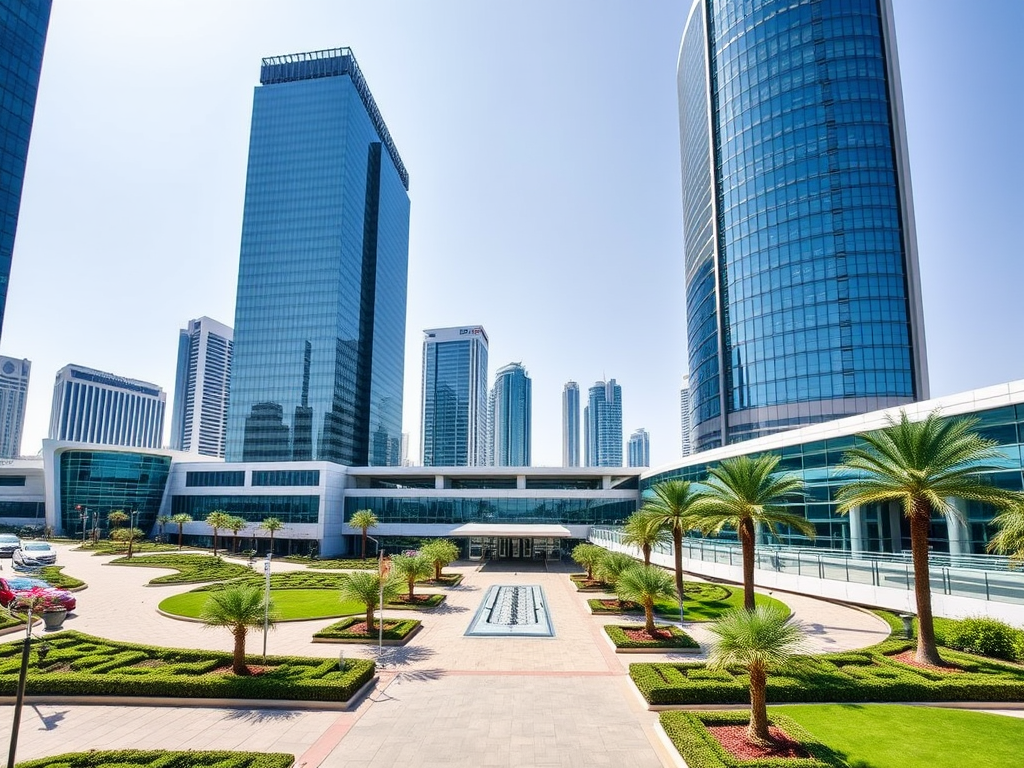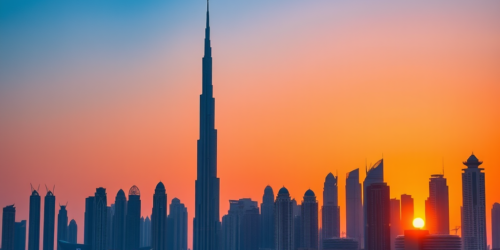How Dubai Became a Global Financial Center
Dubai’s transformation into a global financial center is a remarkable journey marked by strategic planning, infrastructural development, and a commitment to fostering a dynamic business environment. From its humble beginnings as a trading post, Dubai has evolved into a hub for international finance, attracting businesses and investors worldwide. This article explores the key factors that contributed to Dubai’s emergence on the global financial stage, including its strategic location, regulatory framework, state-of-the-art infrastructure, and the role of free zones.
The Strategic Location of Dubai

One of the primary reasons for Dubai’s success as a global financial center is its strategic geographical location. Situated at the crossroads of Europe, Asia, and Africa, Dubai serves as a convenient hub for international trade and finance. This advantageous positioning allows businesses to access emerging markets and established economies with ease. Furthermore, the city’s proximity to major shipping routes enhances its appeal as a key logistics and commerce center. The following elements highlight Dubai’s strategic benefits:
- Connectivity: Dubai International Airport is one of the busiest airports globally, facilitating seamless travel and trade.
- Time Zone: The UAE operates within a time zone that overlaps significantly with major international financial markets.
- Transportation Infrastructure: Well-developed ports and road networks support efficient supply chains.
Regulatory Framework and Business Environment

Dubai’s regulatory framework has been pivotal in establishing a conducive environment for business operations. The government has implemented pro-business policies and reforms aimed at attracting foreign investment. Key initiatives include the introduction of tax incentives, such as 0% corporate tax rates in certain sectors, and simplified company registration processes. Moreover, the establishment of the Dubai International Financial Centre (DIFC) has provided a robust legal framework governing commercial disputes, which instills confidence in investors. This favorable environment encourages multinational corporations to establish operations in Dubai, further solidifying its position as a financial hub.
In the digital age, technology plays a crucial role in the financial sector. Dubai has embraced innovation, integrating advanced technologies into its financial services. The city’s commitment to becoming a smart city means that financial services are often at the forefront of technological adoption. Blockchain technology and fintech startups have flourished in Dubai, supported by government initiatives and funding. The following advancements have significantly contributed to Dubai’s financial sector growth:
- Blockchain Initiatives: Dubai aims to become the first blockchain-powered city by 2021, enhancing transaction efficiency.
- Fintech Growth: A surge of fintech companies is redefining financial services, offering consumers and businesses more options.
- Digital Banking Services: Traditional banks are now offering increased digitization through apps and online services.
State-of-the-Art Infrastructure
The infrastructure in Dubai is exemplary, showcasing a futuristic vision that attracts global businesses. The city boasts world-class office spaces, hotels, and transportation facilities. The construction of iconic skyscrapers and business hubs, such as the Burj Khalifa and Dubai World Trade Centre, reflects the ambition of the city. Investments in transportation, including a vast metro system and efficient road networks, facilitate ease of movement for professionals and goods. This exceptional infrastructure is a critical component that helps to sustain Dubai’s status as a global financial nexus.
The Role of Free Zones
Dubai’s numerous free zones have played a significant role in attracting global companies and investors. These zones provide advantages such as 100% foreign ownership, tax exemptions, and minimal regulatory barriers. Dubai International Financial Centre (DIFC) serves as one of the most prominent free zones specifically tailored for financial services. The free zone model has been pivotal in diversifying the economy, enabling financial firms to operate in a business-friendly environment. The key benefits of Dubai’s free zones include:
- Tax Incentives: Companies in free zones benefit from reduced tax liabilities.
- Ownership Flexibility: Foreign investors can own 100% of their business without needing a local partner.
- Streamlined Business Set-Up: The establishment process is significantly faster and less bureaucratic.
Conclusion
Dubai’s ascension as a global financial center is a result of its strategic location, favorable regulatory environment, technological advancements, top-tier infrastructure, and the implementation of free zones. These elements combined have created a thriving economic ecosystem that continues to attract investment and talent from around the world. As Dubai looks to the future, its commitment to innovation and excellence promises to maintain its status as a leading financial hub for years to come.
Frequently Asked Questions
1. What is the significance of Dubai’s location for financial businesses?
Dubai’s location enables easy access to key markets across Europe, Asia, and Africa, making it an ideal hub for international trade and finance.
2. What are the key benefits of the Dubai International Financial Centre (DIFC)?
The DIFC offers a robust legal framework, zero corporate taxes for 50 years, and access to a growing marketplace of financial firms.
3. How has technology impacted Dubai’s financial sector?
Embracing digital transformation, Dubai has become a frontrunner in fintech and blockchain innovations, enhancing the efficiency and reach of financial services.
4. Are there tax incentives for businesses in Dubai?
Yes, Dubai offers various tax incentives, including 0% corporate tax in many free zones, attracting many foreign investments.
5. What role do free zones play in Dubai’s economy?
Free zones provide favorable conditions for foreign investment, including 100% ownership, reduced taxes, and simplified regulations, contributing significantly to Dubai’s economic diversity.





